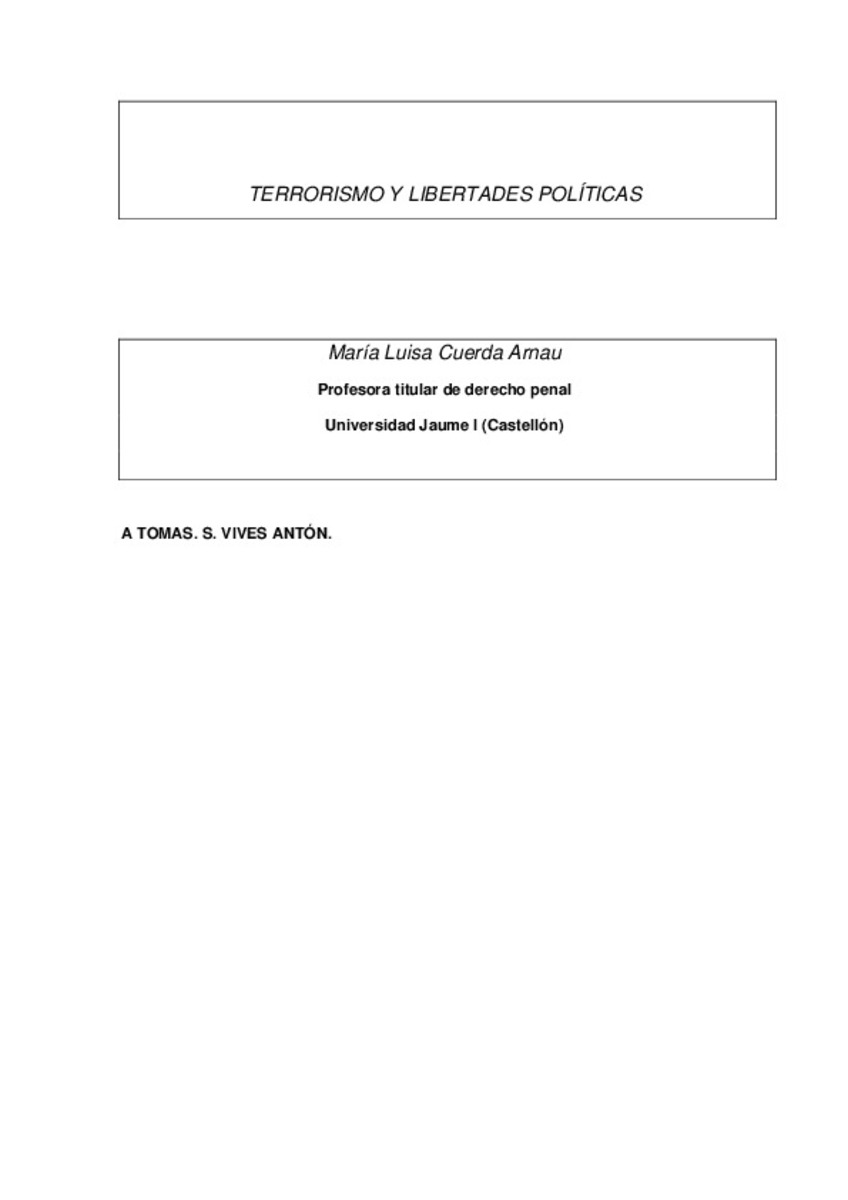Mostrar el registro sencillo del ítem
Terrorismo y libertades políticas
| dc.contributor.author | Cuerda Arnau, Maria Luisa | |
| dc.date.accessioned | 2010-07-19T11:11:10Z | |
| dc.date.available | 2010-07-19T11:11:10Z | |
| dc.date.issued | 2008 | |
| dc.identifier.citation | CUERDA ARNAU, M. L. Terrorismo y libertades políticas. Teoría Y Derecho, 2008, 3, 61-97 | |
| dc.identifier.issn | 1888-3443 | |
| dc.identifier.uri | http://hdl.handle.net/10234/16474 | |
| dc.description.abstract | El artículo analiza las repercusiones que sobre algunas libertades políticas tiene el actual discurso de la inseguridad y la emergencia cuando se proyecta sobre la legislación antiterrorista, que es, sin duda, el área criminal de la expansión y la excepcionalidad por antonomasia. Aquí se pretende advertir una vez más de los riesgos que ello comporta, focalizando la atención sobre el impacto que todo ello puede llegar a tener sobre tres libertades políticas nucleares: la libertad de asociación, la libertad ideológica, religiosa y de culto y la libertad de expresión, cuyas posibilidades de vulneración resultan hoy acrecentadas, entre otras causas, por la aparición de un nuevo terrorismo con respecto al cual ya son demasiados quienes propugnan un tratamiento diferenciado frente al que se otorga al viejo terrorismo y, por tanto, basado en la doblemente peligrosa idea de que cabe la excepción de la excepción. | |
| dc.description.abstract | This article analyses the consequences that the current discourse on lack of safety and emergency has on certain political freedoms when it is applied to antiterrorist legislation which is, undoubtedly, the criminal area of expansion and exceptionality par excellence. This is an attempt to warn once more against the risks that the above-mentioned idea entails. Attention is drawn to the impact that it all can have on the three fundamental freedoms: freedom of association, freedom of ideology, religion and worship, and freedom of speech. Today, the chances to violate them have increased, among other reasons, because of the emergence of a new form of terrorism in the face of which too many people advocate for a differentiated treatment to that given to the old form of terrorism. Therefore, this treatment is based on the doubly dangerous idea of exception within exception | |
| dc.format.extent | 56 p. | |
| dc.language.iso | spa | |
| dc.publisher | Tirant lo Blanch | |
| dc.relation.isPartOf | Teoría & derecho, 2008, n. 3 | |
| dc.rights.uri | http://rightsstatements.org/vocab/CNE/1.0/ | * |
| dc.subject | terrorismo | |
| dc.subject | libertades políticas | |
| dc.subject | antiterrorist legislation | |
| dc.subject | freedom of ideology | |
| dc.title | Terrorismo y libertades políticas | |
| dc.type | info:eu-repo/semantics/article | |
| dc.rights.accessRights | info:eu-repo/semantics/openAccess | |
| dc.relation.publisherVersion | https://teoriayderecho.tirant.com/index.php/teoria-y-derecho/article/view/307 | |
| dc.type.version | info:eu-repo/semantics/acceptedVersion |
Ficheros en el ítem
Este ítem aparece en la(s) siguiente(s) colección(ones)
-
DPU_Articles [392]







